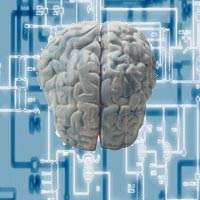http://edition.cnn.c.../19/acd.00.html
SNYDER: Yes, well not shocking it. These are gentle magnetic pulses in the left temporal lobe that simulate sort of damage that you sometimes see with autistic savants.
COOPER: And you ask your participants to draw a picture of a dog before, during and after this procedure. On the left we're seeing the before. It's a rather primitive one as the process is going and even after the process. The one on the far right is after this process is over. It's a more accurate I guess representation of a dog.
SNYDER: Yes, what we find in almost all of our participants is they start off drawing sort of caricatures of animals and then after ten minutes or so of what we call transcranial magnetic stimulation, they start drawing much more naturalistically. Their style completely changes and then 45 minutes later most people have reverted back to their normal style that they started with.
It's fascinating how depressing activity in one part of the brain can lead to increased artistic and creative ability.
Exploring this idea further there are autistic savants who are mathematical geniuses but are severely socially impaired. My hypothesis is that depressing a certain region(s) of the brain using this magnetic pulse method may induce a compensating effect where other region(s) of the brain become more active. I've heard doctors make such conjectures before, in the case of both Alzeheimer's disease patients and autistic savants.
An old man with Alzeheimer's disease had a degenerating brain as a result of the brain plaque associated with that disease, for a brief period of a few months to a year he became a brilliant artist but regardless he was a person incapable of taking care of himself. The doctors believed that one part of his brain associated with creativity (or something of the sort I'm recalling from memory) was overcompensating for the other failing parts of the brain. The degeneration eventually degraded that ability as well and he lost his artistic skill for the most part and he went into cognitive oblivion.
Now I think that since Mr. Snyder was able to induce this brain dampening effect temporarily it might be possible to induce a higher logical/mathematical intelligence by depressing a certain region(s) of the brain using his method. This is obviously not an ideal state to remain in permanantly but this exploration of the cognition is something worth exploring nonetheless.
I have no medical experience and have not taken any courses in that field so I'm asking those with more experience/knowledge in this general area to input their opinion. Thanks.













































